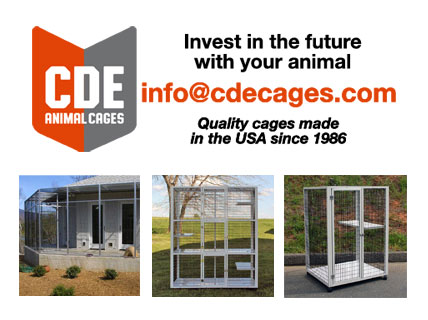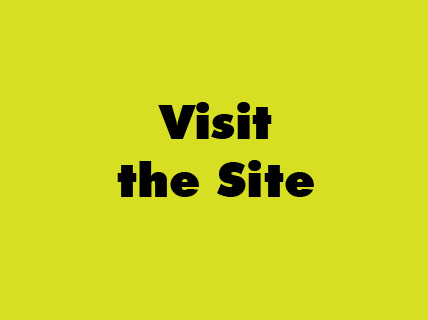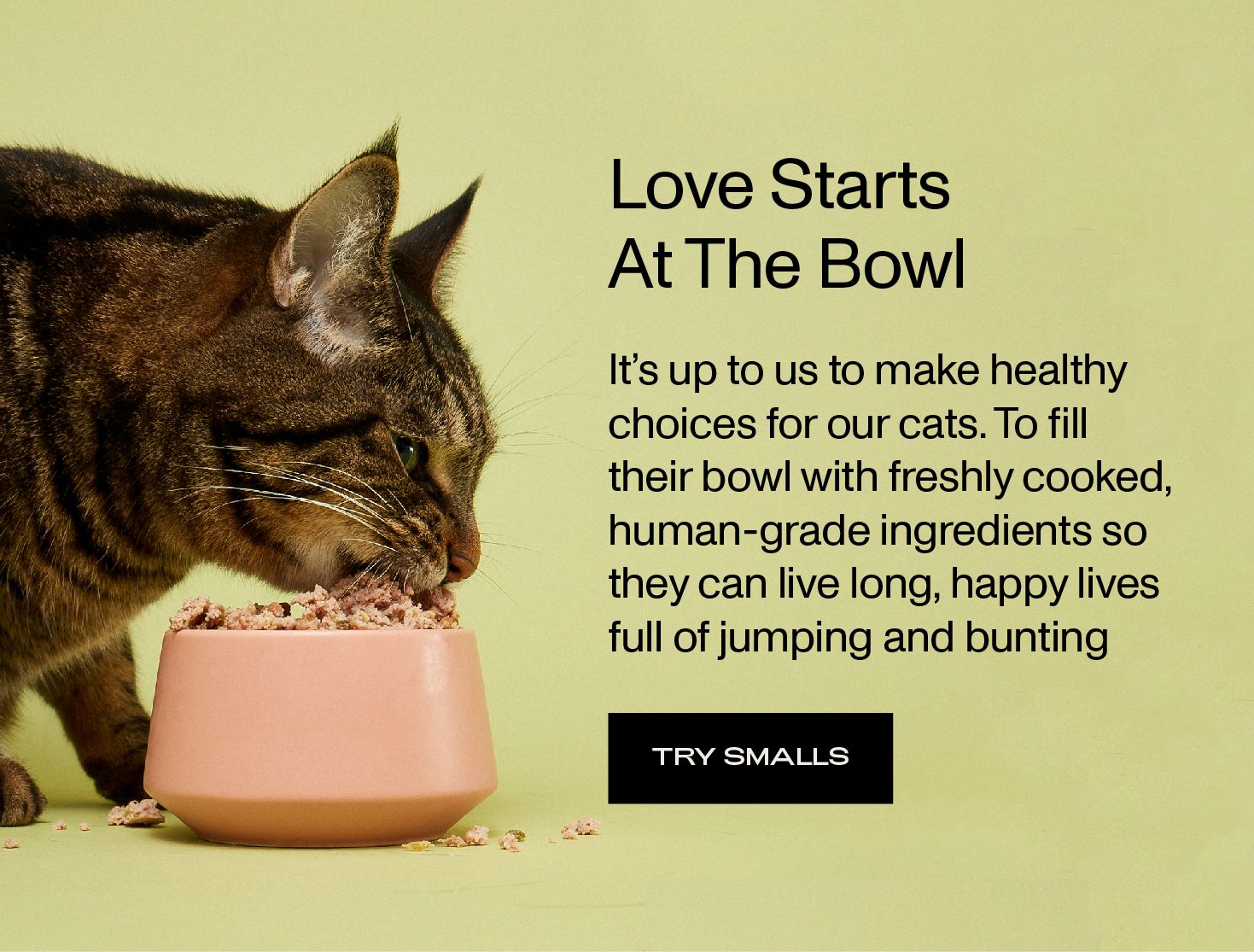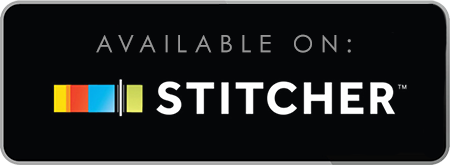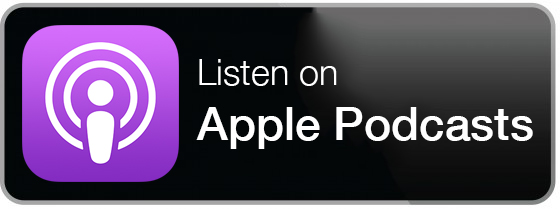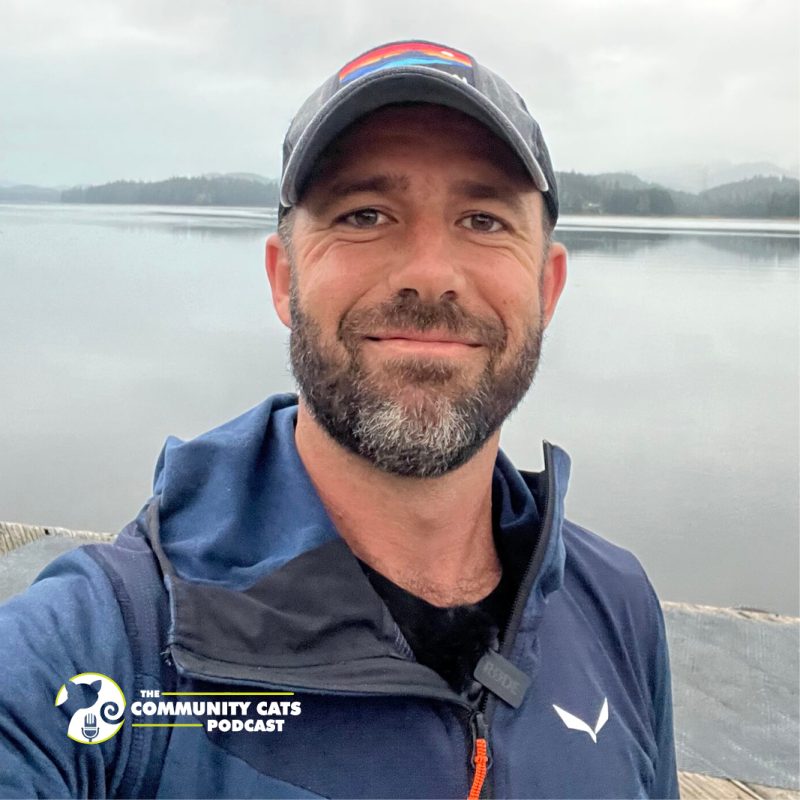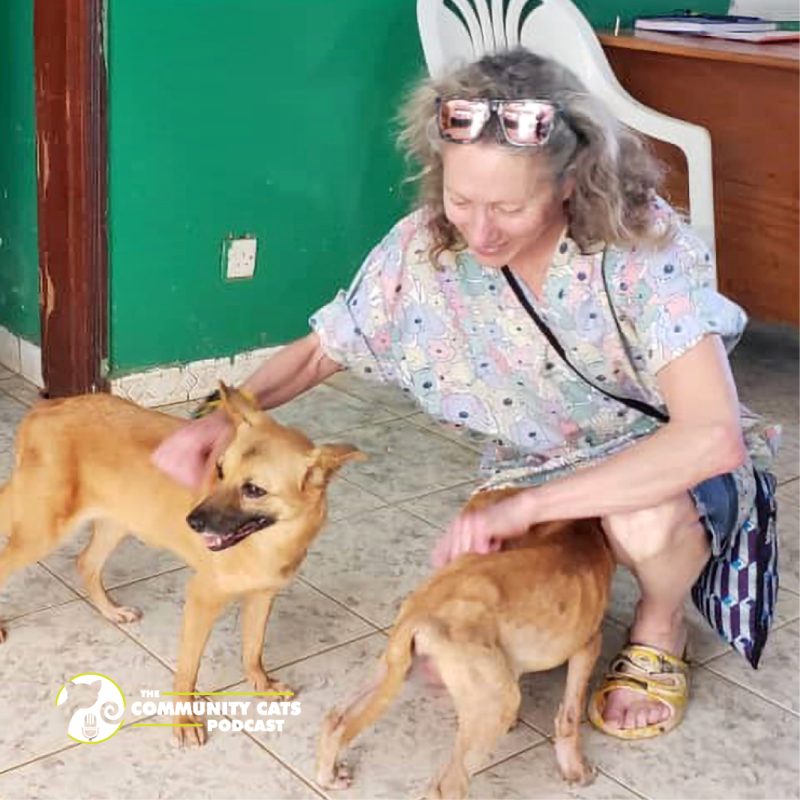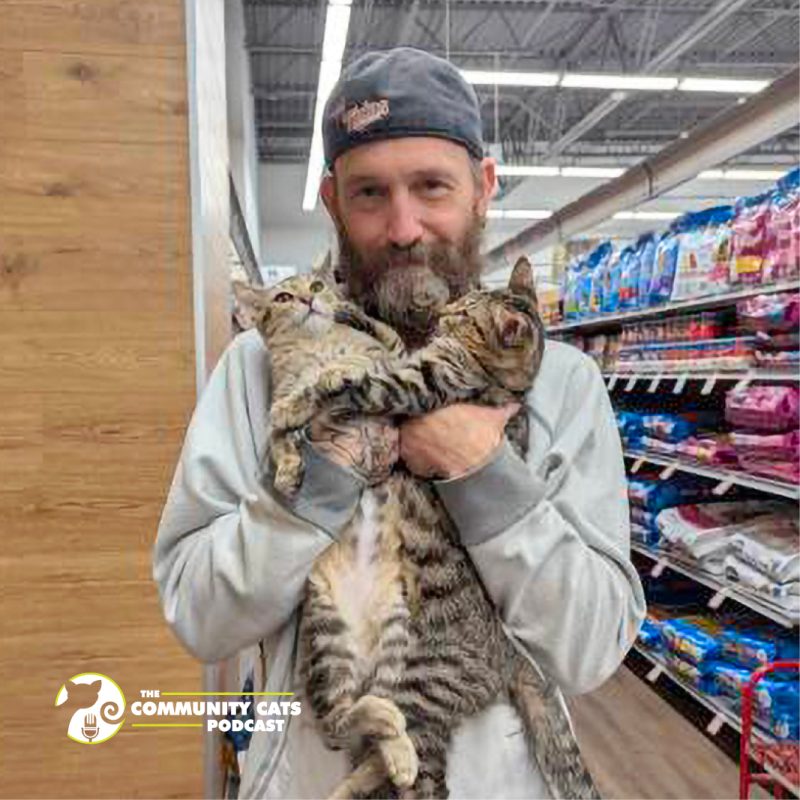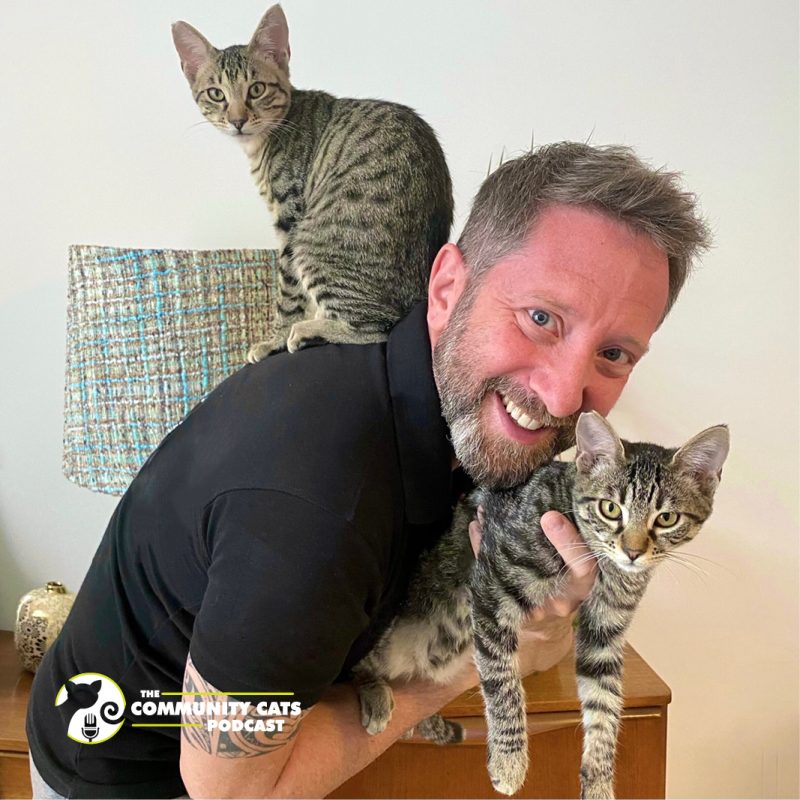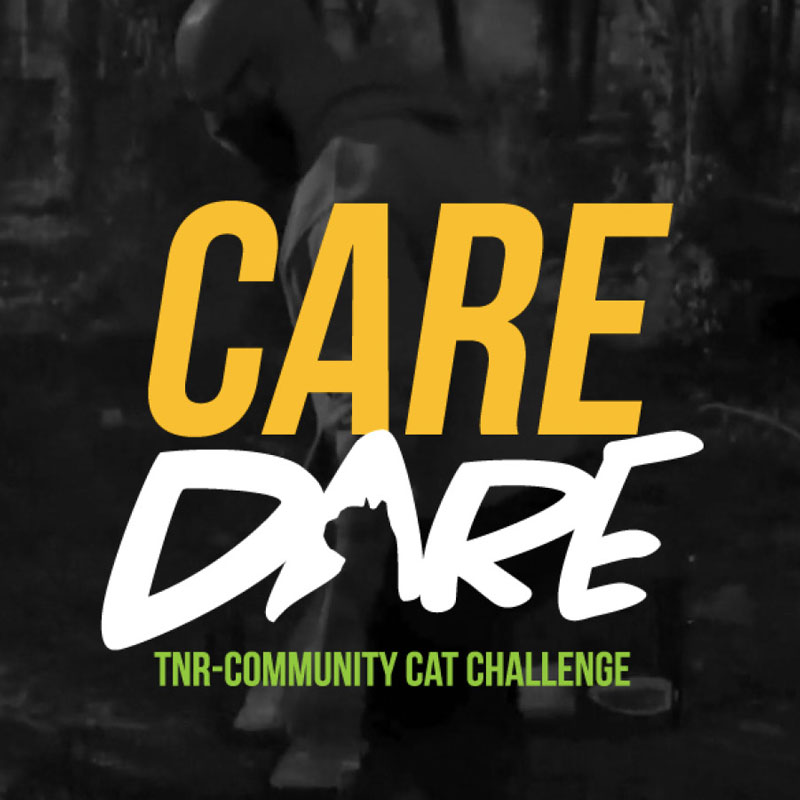
Special Episode! Care Dare
May 7, 2021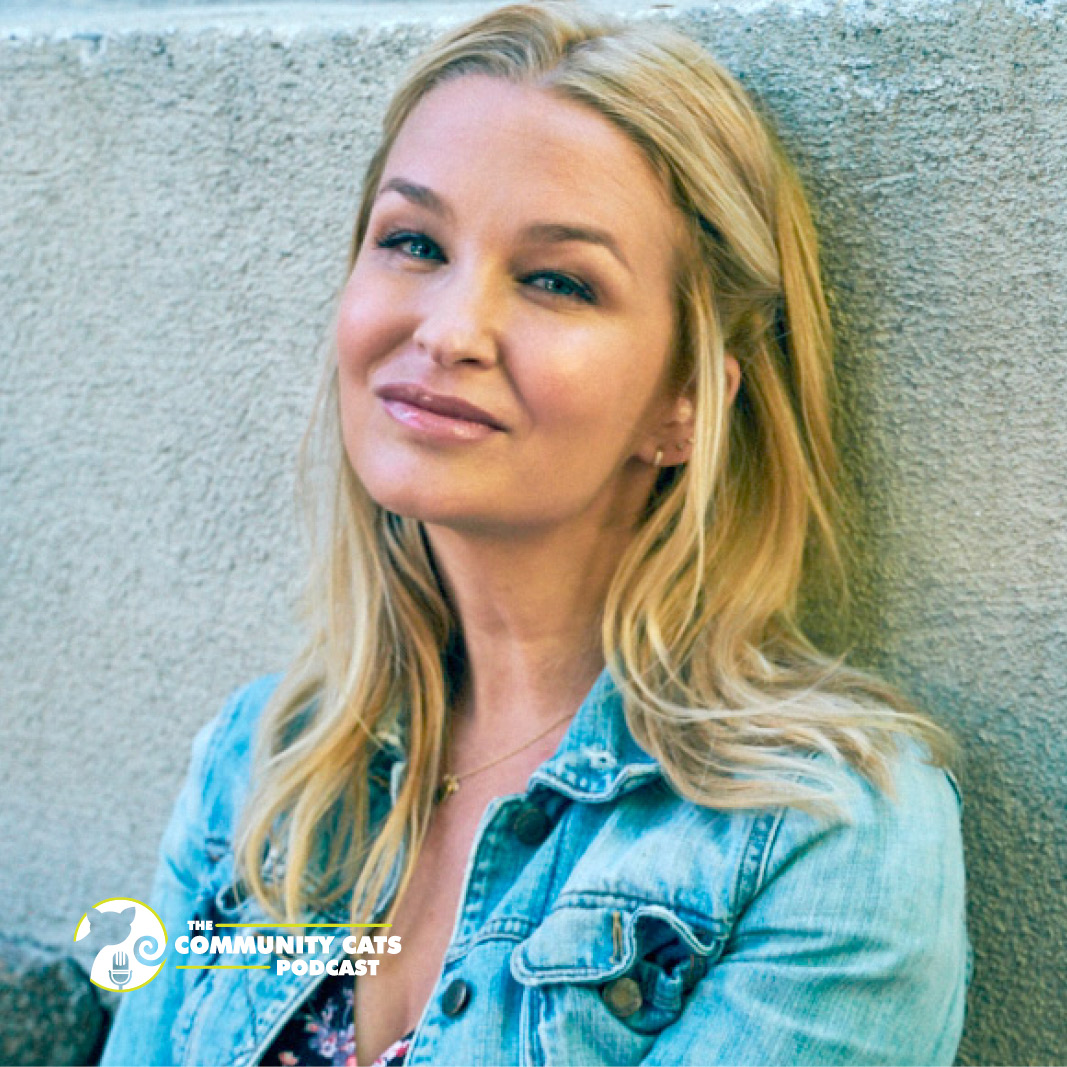
Reagan Pasternak, Author of Griffin’s Heart: Mourning Your Pet with No Apologies
May 18, 2021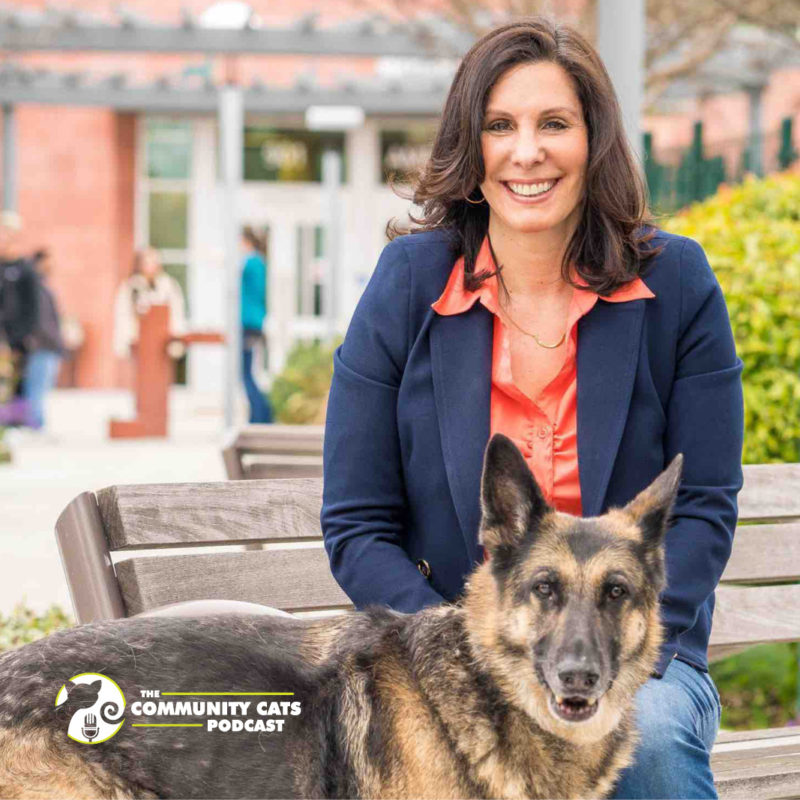
“I wanted to change the conversation from people or animals to people and animals.”
Listen to Episode #403 Now
This episode is sponsored in part by CDE Cages and Doobert.com.
This week Stacy talks to Carol Novello, founder of Mutual Rescue, a national initiative that highlights the power of human-animal relationships. She is also the author of Mutual Rescue: How Adopting a Homeless Animal Can Save You, Too. Carol worked in corporate America before transitioning to the nonprofit space, where she spent a decade as the president of the Humane Society of Silicon Valley. She is a recipient of the Maddie Hero Award and a member of the board of directors of Cuddly.
Mutual Rescue was born of the idea that helping animals helps people. They created films that showcase stories of people who were saved by their rescued animal and published a book that combines those stories with the science behind the human animal bond. Now Mutual Rescue is working on creating programs in collaboration with local shelters and rescues that can provide tools and messaging that can be used by organizations all over the country and collaborating with corporate sponsors to provide national funding to local organizations.
Stacy and Carol chat about what expertise in business and leadership Carol brought from her corporate jobs into the nonprofit world, how to create a culture of philanthropy, and how COVID-19 is affecting operations.
To find out more about Mutual Rescue, to watch some of their inspiring videos, or to find their book, visit their website (Carol recommends the film on Josh and Scout for cat lovers).
Read Episode #403
Kristen Petrie [00:00:02]
You've tuned in to the Community Cats Podcast. Ready? Let's go!
Stacy LeBaron [00:00:13]
Welcome to the Community Cats Podcast. I am your host, Stacy LeBaron. I've been involved helping homeless cats for over 20 years with the Merrimack River Feline Rescue Society. The goal of this podcast is to expose you to amazing people who are improving the lives of cats. I hope these interviews will help you learn how you can turn your passion for cats into action.
Today we're speaking with Carol Novello. Carol is the founder of Mutual Rescue, a national initiative that highlights the life-changing power of human-animal relationships.
The initiative’s first short film, “Eric and Peety”, went viral around the world with over a hundred million views and was named the number one video news story in California by the New York Times in 2016.
She's currently expanding the initiative into a new national nonprofit brand to collaborate with local animal shelters and rescue groups and their communities across the country and bring new funding into the sector through corporate sponsorships.
Her first book, Mutual Rescue: How Adopting a Homeless Animal Can Save You Too was published in April 2019, with international versions of the book released in Germany and Italy in 2020.
Mutual Rescue was created during the nearly decade-long tenure that Carol served as president of the Humane Society of Silicon Valley, from 2010 to 2020. She also served one year on their board of directors prior to that role. Through her leadership, HSSV became the first model shelter-- the first organization in the nation to meet all guidelines set forth by the Association of Shelter Veterinarians. Her work at HSSV also resulted in significant increases in the rescue organization’s adoptions numbers, save rates, and the number of animals receiving extended care.
In 2016, she was one of nine animal welfare, leaders across the country to receive the first Maddie Hero Award created by Maddie's Fund for recognizing Innovation and leadership in the sector. She's also currently serving as a member of the board of directors at Cuddly, a for-profit company that has created a fund raising and wish list platform focused on the animal welfare sector. Prior to entering the field of animal rescue, Carol was a senior executive at Intuit, where she held numerous positions including President of Master Builder Software, Vice President, General Manager of QuickBooks Online and Vice President of Marketing for QuickBooks and Small Business Services,
Carol earned her MBA from the Harvard Business School and her BA in English and economics from Dickinson College. She currently resides in Serenbe, a community outside of Atlanta, Georgia, and shares her home with two rescue cats. Bodie and Herbie. Carol, welcome to the show.
Carol Novello [00:02:44]
Thanks Stacy. It's a delight to be here.
Stacy [00:02:47]
So, incredible information here in your bio, and I can't wait to dive into everything. But first, how did you become passionate about cats? You've got to tell me.
Carol [00:02:56]
Cats have been around me since day one. And when I look through family pictures, there's a great photograph of my mom holding me, and my grandmother holding a cat. And the three of us are together and that really sums it up: my grandmother was a cat lover; my mom was a cat lover. So I think it was genetic, honestly, because I think I came out of the womb loving cats and we always had them in our house. Some of my fondest memories of growing up include cats, especially one where when I was 5 years old my family and I went to go pick out a Christmas tree and at this Christmas tree farm, there was a stray cat. And I begged my mom-- I said, “Please-please-please can we take the cat home?” And much to my amazement My mother said, “Yes.” That was so thrilling, and I think that's where my rescue career actually started in terms of having a soft spot for homeless animals and wanting to help them do better and just how rewarding it is to do that.
Stacy [00:04:06]
That's fantastic. But it seems like, you know, if you had this passion for cats as a child, but you went on a business career to start with... So you went to the Harvard Business School and you went into Corporate America and worked there. What created the desire to change and sort of move--move out of that space, and go into the nonprofit world?
Carol [00:04:27]
I have to be honest: it was pure—pure serendipity. I did not have a master plan, and while animals were always an important part of my life and something I felt passionate about, I had never focused on that as quote “being my career.” But what ended up happening was, I was a senior executive at Intuit for many years. And it was a fabulous career and a great company. And if I wanted to work in such a large company or continue my career there, there's no other company I'd rather work for.
But I found myself, you know, really feeling like I needed to take a step back and probably work for a smaller organization. And I thought I was going to go back into high-tech, but I just decided to take some time off and do things that were of interest to me and animals being at the top of the list. So I did some consulting projects for nonprofit organizations that are involved in animal welfare or some aspect of animals. I raised a guide dog puppy. I did a number of different things— then it was through serendipity that I ended up meeting a woman--and actually the introduction was because she was in high tech. So my significant other at the time introduced me to her, thinking --oh, you know, she might be helpful in the context of finding my next high-tech job. But as it turns out, she was chairwoman of the Humane Society of Silicon Valley. We hit it off over animals, and then that led to me having the opportunity to join the board at Humane Society o, Silicon Valley. Then six months after I joined the board, the President at the time and the board Chair at the time asked me if I would like to become president because the current president wanted to retire?
Well, I had not anticipated that I would take a Harvard MBA and being a senior executive at Intuit and turn that into something I would do for a non-profit or for animals. I realized it was this tremendous opportunity to combine my skill set, which turns out was very relevant in terms of running a large organization and using that to help animals. And ultimately help people too.
Stacy [00:06:29]
I'm going to have to ask: So. you were on the board for about six months or a year or so, and then you went into playing the role of leading their operations. So you had been a board member for a short period of time and then you really got into the day-to-day. What lessons did you learn or what things did you see in that nonprofit space? And I'm sure the Humane Society of Silicon Valley probably operated as a very professional nonprofit but there are differences between the for-profit world and the nonprofit world. What were the things that you've brought to the Humane Society of Silicon Valley? We read the various, you know-- becoming certified in the shelter guidelines and that kind of thing. But, you know, there's also culture there and community and having somebody coming from the corporate world into a non-profit space. How were you received? And you know, how did the changes come about within that culture?
Carol [00:07:21]
So I think the biggest thing that I brought to the organization was a willingness to spend time on process. Because I think that was the thing... I think that's the thing that a lot of nonprofits struggle with is, how do you create processes and protocols that enable an organization to scale? Because when you're smaller, you're super reliant on one person, or you've got one person doing multiple things, and it's very ad hoc. And you solve the problem that is immediately in front of you. I think that's the best way to describe what happens in a smaller organization and in a larger organization, you really have to take a step back and look at what is happening systemically: How is the work getting done? How do you organize the work so it's done most efficiently? No one person can answer that question. It has to be a cross-functional, team-based approach so that you're actually optimizing for what it is you're trying to solve for.
[00:08:29]
And that creates new dynamics in terms of how do teams and people interact with one another because in a smaller organization, you might not necessarily have what feels like competing goals. And so sometimes when you have a larger organ[ization]--often times when you have a larger organization, what might be the right thing for the organization, overall, at any point in time, one part of the system or one team, one department needs to be optimized [00:09:00] and another one sub-optimized to make the whole thing work the way it should. So you have to create new ways of communicating, new ways of resolving conflict. I like to talk about leadership as it encompasses three things. The first is aligning expectations. The second is removing obstacles, and the third is resolving conflict. Creating a culture that enables that is hugely important.
Carol [00:09:30]
I think another aspect that I brought to the table was working very closely with our head of development around creating a culture of philanthropy. So as a non-profit, we rely on the generosity of our community to make our work possible and it needs to be instilled in everyone in the organization regardless of where you work and what you do, that you are part of creating a culture where the community wants to give to you that you are [00:09:59] thankful to the community for supporting the work and that we are offering a service that is of value. And that, again, is a very different approach versus, ”Oh, that's developments job to bring in the money.” And it's like, “No, No. No, it's everyone's job. And the mission work and the impact of the mission work is actually what makes that fundraising possible.”.
Stacy [00:10:20]
So, you’re interweaving--I mean, I try to share with people, you know, every person that we touch in whatever way, has a capacity to give and we need to always think that way. We also-- everybody that we touch, it has a capacity of maybe needing our assistance or they could volunteer for us. I mean, they’re-- it's part of this family-type thing. Once we touch someone--we talked to them about the organization-- just by doing that they become part of our community.
Carol [00:10:47]
Well, and not only that, but people are inspired by the work and the people that are doing the work are doing that in ways that they may not even recognize and one of my favorite stories, as it relates to the culture of philanthropy is we had an animal care technician. His name is Scott and he loved just making sure that the cat condos looked great and he would. So not only, I mean, I don't know if the cats care that the rooms were color-coordinated, but it certainly was more inviting for potential adopters which made them more likely to consider an animal. So, it really was benefiting the animals that he cared about how the condos looked. And we received a $10,000 donation [00:11:29] one day and it turns out it was actually from a woman who volunteered in the organization. We always like to ask donors what inspired them to make that donation? And she said, “Scott's love of animals and just how he, you know, cares about how the cat condos look, so that it really is inviting to adopters which helps the cats. That's what inspired me to make this gift.” How amazing is that? So, you know, part of our responsibility as a leader of an organization--or anyone’s—is to share those stories [00:11:59] so, people really understand and can connect the dots how you're showing up, how you're doing your job, that makes difference and wow, in that case it made a ten thousand dollar difference. This is really pretty amazing.
Stacy
That's fantastic. Yeah. I love hearing those stories. They're wonderful.
- --Start mid-roll advertising –
- Stacy LeBaron [00:12:18]
- Are you one of the selfless members of our society, that spends time rescuing and bettering the lives of cats and your community? If so, wouldn't it make sense to do the most of what you can do with the space you have? CDE Animal Cages is a family-owned and operated business that has been handcrafting the highest quality small animal cages for over 30 years ,with the goal of connecting shelters and rescuers with comfort and security-- for the health of the animals they work with and ease of use for the humans that take care of them. Open air and closures with very solid options and portalized options, have proved not only to reduced euthanasia rates, but make for more adoptions and healthier and happier, animals. Our high quality materials are designed [00:12:59] to last for decades, ensuring that you only shop for cages once-- leaving more time to spend with the cats in your life. Get started today by logging onto cdecages.com to design your perfect setup, invest in the future of your cats with CDE Animal Cages.
- Are you ready to be part of the solution for feral and stray cats in your neighborhood? If so, then make sure to sign up for our next Neighborhood Cats TNR Certification Workshop. A new workshop is held online each month, generally on the first Saturday of the month. But please [00:13:29] check our website for exact dates. For just $10, expert instructors will teach you best practices for trap- neuter- and return: TNR. Learn what TNR is and why it works. We’ll cover getting along with neighbors, preparations for trapping, trapping itself--including entire colonies at once, feeding, providing winter shelter and more! Take advantage of the interactive format, extensive handouts, and video footage of actual projects. Attendees, will receive a certificate of attendance and gain access to an ongoing [00:13:59] Facebook group, for networking with other TNR, activists. The two-and-a-half-hour workshop is led by Susan Richmond, the executive director of Neighborhood Cats, and Bryan Kortis, Neighborhood Cats national programs director. To find out the date of the next workshop and sign up, just visit communitycatspodcast.com.
- As we emerge from the global pandemic of COVID, fostering is emerging as the “new normal” in the Animal Welfare industry. But shelter management software doesn't provide the tools or the workflows for communicating with [00:14:29] fosters at scale. So many organizations struggle to maintain, hundreds of animals and foster homes. If only there was a system that was custom-built specifically to solve this problem! Introducing Foster Space, powered by our friends at Doobert. Foster Space was custom-built to allow you to manage hundreds of foster relationships and to communicate with them via text, email, and even Facebook Messenger. Your fosters have a portal where they can upload videos, photos and updates on their animals. Organizations can schedule fosters for meet-and-greets, adoption days, [00:14:59] or anything else they need. There's so much more to check out! Sign up for free at www.doubert.com and go to the Foster Space tab to get started.
- --End mid-roll advertising—
Stacy [00:15:12]
So. after your 10 years at HSSV, you decided to move on and do something else—and looking towards doing something in a more national level. What were you seeing that was missing out there? And why was it important for you to create something at a larger scale?
Carol 00:15:28
So Mutual Rescue actually came out of the work of Humane Society of Silicon Valley, and technically it's legally part of Humane Society of Silicon Valley. It's just that it is a national initiative. So there's a firewall in the context of funding that comes into Mutual Rescue is used for Mutual Rescue, not for Humane Society of Silicon Valley and vice versa. But essentially, how Mutual Rescue came about is people would sometimes ask me, “Why are you helping animals when you could be helping people?” And I thought that was [00:15:59] quite a curious question because I have just seen how impactful animals have been not only in my own life, but from adopters and felt it was really important to change that misperception. I wanted to change the conversation from people or animals to people and animals.
And as I dug a little bit deeper, what I learned is, of the 449 billion dollars that Americans give to charity every year, only three percent goes to animal and environmental causes combined. And that really highlighted for me that what I was hearing was true on some level, but somehow Animal Welfare was this second-class sector in terms of giving. Even people that were writing checks or volunteering would say to me, “Oh, I feel guilty.” And I was like, “Wow, how do we get rid of that idea?”
[00:16:48] And so I started going out of the community giving a presentation called “Why Helping Animals Helps People” and was doing that for a while and then a board member had someone that she knew --a man by the name of David Whitman--who used to produce the Tech Awards in Silicon Valley. She said, “Hey, he really wants to get involved and do something with animals. Would you meet him? And just, you know, see what comes with it?” And so I met David and I just thought he was this creative genius. And I said, “I have no idea how we're going to work together. But if you're willing to just hang out in this space where we throw ideas against the wall and see what might come out of it, you know, let's do that.” He's actually the person that coined the phrase Mutual Rescue. [00:17:26]
We started making short films to illustrate this very point. And we took one of the first stories that I was sharing in my local community, around Eric and Peety, which was a man who had become extremely overweight and his doctor recommended that he adopt a shelter dog and walk that dog a half an hour every day. He ended up losing over a hundred forty pounds. So we made that short film in an effort to ask other people to submit their stories of mutual rescue.
[00:17:59]
And it was a phenomenal success as you highlighted in the introduction. That led to --we've created think at least 12 more films, many of which include cats. Probably our most beloved cat film is Josh and Scout, which is the story of a stray cat that crawled out from underneath a bush and prevented a veteran from taking his life in a very dark, dark night. It's just an amazing story. So, if you go to Mutual Rescue dot org [00:18:29] you can check out Josh and Scout, Jake and Trug, Kylie and Liza. Those are all great cat stories that we have on Mutual Rescue. But in any event, we started creating this very compelling content. The other films also did incredibly well on social media. That led to the opportunity to write a book, “Mutual Rescue: How Adopting a Homeless Animal Can Save You Too”, which not only tells the stories, but it also brings in the science. [00:18:58] I think that's what makes it so compelling, is that -- Yes, we have this, this feeling or this experience with an animal, but then here's the data that backs it up and says, hey science is saying that this is real. It's not in your imagination. It's not just a one-off. It's a real thing that when we interact with an animal there are physiological and psychological changes that are going on. And so not only are we saving a life when we rescue and adopt an animal, but we're transforming our own. [00:19:28] That is a pretty amazing thing that is happening out there, and I really wanted to highlight it so that we can change this perception that it's people or animals when in fact is people and animals.
So, we've gone on to expand the initiative to really create a new national nonprofit brand. And what we're doing there is, we're creating programs in collaboration with other local organizations [00:19:58] to create our first program was called Doggy Day Out. We collaborated with shelters that already have these programs to create a toolkit that would make it easier for other shelters in communities to implement those programs. So, if you go to mutual rescue dot-org, you can see our directory. If you're looking for the program, you can find one. If you want to start a program, you can get the tools.
So we're now in the process of working on a new program because Doggy Day Out, is kind of taking a backseat now with COVID, but our new program we're going to be piloting [00:20:28] a Pet Pantry program, where we'll be doing national messaging and providing opportunities to make it really easy to make, you know, fulfill wish lists for particular organizations all across the country. That will be our next pilot. And then the next component of the brand is to be able to bring in corporate sponsorship. So, corporations are not--it's very hard to get a national corporation to sponsor a local organization, because they just don't have the footprint that they need. [00:20:59] So the idea behind Mutual Rescue is that you can create national messaging, national awareness-- national campaigns, which is attractive to a corporate sponsor. But then those funds are actually going out to the local level.
So, we just received a very generous donation from Dutch Bros, which is a coffee chain out on the west coast. They gave us a $100,000 donation and we were able to make ten ten-thousand-dollar gifts to local shelters that were working in their geographic footprint. So that's the power of having a national brand that can then drive funding to the local level.
Stacy [00:21:32]
That's great. Fantastic ideas behind that. That's wonderful. And, you know, you mentioned a little bit about their--with your Doggy Day Out program and how things have changed with regards to Covid. You know--are there other things that you've seen in the certainly you mentioned earlier too about like scaling some programs up other programs having to retrench down-- What have you been seeing as reactions to Covid [00:21:57] In the Animal Welfare space that-- what's going to stick and what's not going to stick as the vaccine develops and that kind of thing?
Carol
Well, I think the biggest thing that has been beneficial is fostering. So many people have stepped up to foster during this time. And a lot of people have decided to adopt. I mean, in certain parts of the country where spay/neutering has really taken hold and/or because of weather they can, you know, frequently have less adoptable animals available, you know, there's a waiting list in some places. In warmer climates and larger populations, unfortunately, you know, they're still struggling. So, I think just this awareness of how rich our lives can be made by welcoming animals into our homes, has been a real benefit. And one of the researchers that I interviewed for the Mutual Rescue book, her name is Dr. Cori Bussolarie,.she works out of the University of San Francisco. One of the things that she's done is work with her colleagues [00:22:58] to do research during the pandemic to see how that is influenced our relationship with animals. And in fact, it really has strengthened that connection in our bond with our animals--just how important it is.
I think the biggest thing is the pandemic comes to an end and I just read an article. It was actually based in the UK, but I don't think there's, you know, unfortunately, I think it's likely to play out in the United States as well, is that, you know, is there going to be this rebound effect when people go back to work? are the commitments that they made to these animals initially-- Are they going to decide “ Oh, I don't have time for an animal now,” or “I'm not going to be home now.” We're going to see animals coming into shelters at a much faster rate. I hope that's not the case. I hope that, you know, there's been a lot of bonding and integration into the family that's happened over this time and it's always this balancing act between inspiring people to adopt and wanting to make sure that they understand the responsibilities and the commitment that they're making when they do.
Stacy [00:23:58]
Yeah, that's a very key point. Very interesting. And I do hope, I mean, I think people realized “Well, we weathered the storm together, you know, I'm not going to be able to give you up,” and that kind of thing. If folks are interested in finding out more about your program, Mutual Rescue dot-org is the place to go?
Carol
Mutual Rescue dot-org. Yes, that's the place to go and you can sign up there to get information about future things that we might be working on. As I said, will be doing this pilot for the Pet Pantry. So, if you're interested in that, [00:24:28] you can again sign up for our newsletter and you'll receive word about that coming online. You can also find us on social media or on Facebook, Twitter, Instagram. Facebook is probably our biggest following so you can find us there as well for all kinds of daily inspiration and mutual rescue related ideas and articles.
Stacy
Great. Carol, is there anything else you'd like to share with our listeners today?
Carol [00:24:50]
Well, I just want to encourage people to welcome animals into their homes. And for those that are working in the Animal Welfare space, to just thank you so much for all that you do. It truly takes a community to make this work possible, and it is not easy. And so that's one of the reasons why I actually wrote the Mutual Rescue book, was to provide a bigger picture, because sometimes you get so focused on what you're doing day-to-day that you can lose the impact of the work that you're doing. And so, I wrote Mutual Rescue, really, as a tribute and a thank you to people that are working in the field so they can truly be inspired and really understand the bigger picture impact they're having through the work that they do.
Stacy
Carol. I want to thank you so much for being a guest on my show and I hope we'll have you on again in the future.
Carol
Thanks so much, Stacy. It was really fun.
Stacy
That's it for this week. Please head over to Apple podcasts and leave a review. We love to hear what you think, and a five-star review really helps others find the show. You can also join in the conversation with listeners, cat caretakers, and me on Facebook, and Instagram. And don't forget to hit follow or subscribe on Spotify, Apple podcast Google podcast YouTube, Stitcher or wherever you listen to podcasts, so you don't miss a single show. Thanks for listening, and thank you for everything that you do to help create a safe and healthy world for cats.
Stacy [00:26:10]
The community cats podcast would like to shout out a few of our online event sponsors. Did you attend the United Spay Alliance conference? In March the incredible content and educational opportunity were brought to you in part by Marion's Dream and Humane Network. If you or your organization would like to sponsor content that you care about, and that saves feline lives, go to Community Cats Podcast dot com slash sponsor, and learn more about how you can turn your passion for cats into action.
Background: Amazing, loud contented purr….

